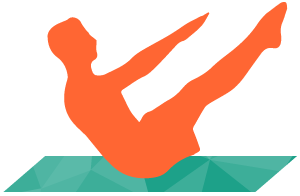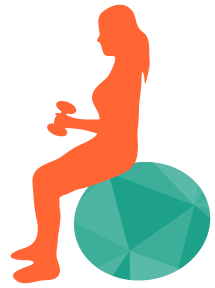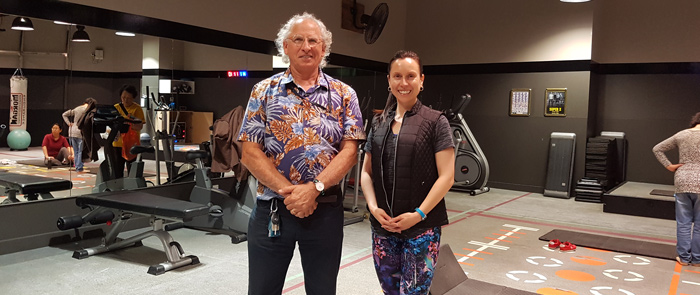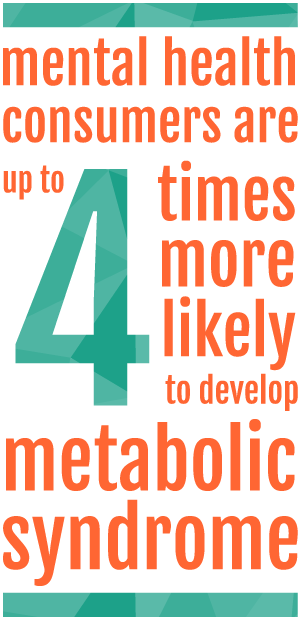Pilates and Mental Health

 The effects of Pilates on mental wellbeing have been well-documented, but a program run by Canterbury Community Mental Health Service is achieving some interesting results by actually making it a part of their client’s treatment.
The effects of Pilates on mental wellbeing have been well-documented, but a program run by Canterbury Community Mental Health Service is achieving some interesting results by actually making it a part of their client’s treatment.
Dennis Magro is a senior social worker at Canterbury Community Mental Health Service. He works with clients who have “serious and persistent” mental illnesses, including some who had experienced psychotic episodes. Dennis says that he started the program to address the effects of metabolic syndrome that were affecting some of his clients. Metabolic syndrome is a term for a group of conditions, such as high blood pressure and cholesterol, insulin resistance and obesity, that can increase a person’s risk of heart disease, diabetes and stroke.
 According to a NSW Health bulletin from 2012, “mental health consumers, particularly those with diagnoses of schizophrenia, bipolar disorder and major depressive disorders, have up to four times greater risk of developing metabolic syndrome than the general population.” While this is partly due to lifestyle factors such as excessive smoking or drinking, there is also a link between metabolic syndrome and certain antipsychotic medications.
According to a NSW Health bulletin from 2012, “mental health consumers, particularly those with diagnoses of schizophrenia, bipolar disorder and major depressive disorders, have up to four times greater risk of developing metabolic syndrome than the general population.” While this is partly due to lifestyle factors such as excessive smoking or drinking, there is also a link between metabolic syndrome and certain antipsychotic medications.
Although there have been several studies done on the link between metabolic syndrome and mental illness, the idea of incorporating physical activity into mental health treatment programs is still relatively new.
“The question remains, once it’s identified, what do we do about it?” said Dennis.
He decided to approach C-Life Health Club, a local gym in Belmore, and started a partnership with them where he brought his clients in to use their facilities a couple of times a week.

Dennis and Vanessa at the gym where they run the Pilates program.
The severity of some of the clients’ conditions made it challenging to find people who were suited for the program, which operated via GP referrals. Dennis says that all potential clients are screened before being admitted to the program.
“Just about everyone comes in with a serious degree [of mental illness] when they start with us,” said Dennis.
“We were very sensitive to where the baseline was for each individual.”
Initially the program consisted of just the bi-weekly gym visits, but after about six months Dennis became interested in incorporating Pilates into the program and approached Vanessa Bartlett, a fitness instructor with about 14 years in the industry, whose focus is Pilates and holistic fitness.
“I’ve kind of come into this not knowing what to expect,” said Vanessa, who had no previous experience with mental health clients prior to being approached by Dennis.
“[Dennis] could see the benefit in doing Pilates because of that mind- body connection that you get. I thought ‘well, I don’t know what I’m dealing with here, but I think that’s been an advantage for me and for them because I haven’t judged people when they’ve come into the class. I don’t know what they’re going through so therefore I have no preconceived ideas.”
The program has been running for 5 years twice a week and both Dennis and Vanessa say they can see a difference in the clients. Dennis says that the clients are reporting sleeping better and needing to visit their GPs less, and he has noticed that they seem to get along better with their case managers and other social workers. Vanessa has noticed similar effects, especially in clients who have been attending classes for over 12 months.
“I’ve noticed within their own personalities just seeing them come in….at the beginning they’re quite timid but after a few months of doing it consistently [you notice] an improvement in their self esteem, their demeanour,” she said.
“I got to asking some of the clients over the years, ‘Why do you keep coming? I’m interested to know…’ One of the girls said to me that the difference between doing gym exercise and Pilates is that anyone can walk on a treadmill but your mind is still wandering and you’re still thinking about your problems, basically. But in a Pilates sense where you have to focus on the movements and the breathing, you don’t have time to think about your problems so it creates this presence and mindfulness.”

“[The program] gives them a bit of confidence, I think,” said Vanessa.
“When you can say, build on your physical strength and actually accomplish something in the class, it’s like a snowball effect. For instance if I get them to do, say, three push-ups, then in a few weeks time they can do ten push-ups, in their mind they know they’ve improved so therefore their brain starts to adapt to other external things in their lives to go ‘well, if I can do this in my exercises, maybe I can do study or something else’. I believe in psychology it’s called self-efficacy.”
Although Vanessa started her career as a more traditional fitness instructor, she was diagnosed with adrenal fatigue in her twenties and had to start looking at alternative ways to keep fit.
” I basically hit burnout point in my mid-to-late twenties by overdoing it – too many pump classes, too many boxing classes, too much of the heart stuff,” she said.
“I had to then look at other ways of staying fit and healthy without doing the gym classes I’d done for 15 years so that was quite a challenge! I was thinking, ‘I’m a personal trainer working at gyms helping clients lose weight and get energy and I’m not feeling any of this myself’, and I started to get quite down about it so it affected me mentally for a little while…I felt really inauthentic at the time as well, just because it wasn’t working for me anymore.”
She tried a few different types of exercise, but what really seemed to suit her was Pilates.
“With the Pilates, something happened in the first few classes,” she said.
“I felt a buzz of energy. When you’ve got adrenal fatigue you’re very, very tired, it’s beyond exhaustion, you feel like you’ve been hit by a truck even if you’ve slept for ten hours. So when I felt this kind of surge of energy in the Pilates class I thought ‘ oh, this is something I haven’t had in a really long time, what’s going on here?’ So I started to do more classes and I thought “This is good, this is sustainable for me to teach.”
“I guess I’ve gone from a hardcore typical fitness trainer to, these days, more of a holistic approach, especially working with mental health clients and seeing how this mindfulness can help them. So that’s my whole philosophy and what I love to help people with, it’s about finding that balance, to live a healthy lifestyle, get to your correct weight without crazy diets, get to your best health mentally and physically through something that’s a bit more sustainable so you don’t get injured, you still work your muscles but it’s not so ‘go hard or go home.’”
According to Vanessa, the Schizophrenia Fellowship has shown a lot of interest in the program, even giving Canterbury Mental Health an award for ‘Innovation in Healthcare’ in 2013. Although the program seems to be one of the first of its kind, the results so far have been promising and
both Vanessa and Dennis say they would like to see it expanded to more areas.
Newsletter
Stay up to date
Sign up to our Mind Reader newsletter for monthly mental health news, information and updates.